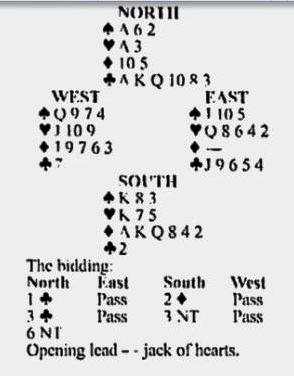Source: Reading Eagle – May 20, 2008
Many contracts fail because the adverse cards are divided in such a way that making the contract is imposible. The contract may be an excellent one looking at only the 26 cards held by dummy and declarer, but if all the crucial finesses lose or the key suits break badly. A disappointing outcome may readly ensue.
All a declarer can do in such cases is to accept the verdict philosophically and go on to the next deal. The true test comes when he can provide against a bad break and neglects not to do so. In that case he has only himself to blame, since he could have controlled the outcome. It is in these instances that the mettle of the first·rate declarer is tested.
Here is an example. Six no trump was an excellent slam to reach and in fact was even a conservative ventura. The normal expectancy would be to score all 13 tricks, if either the diamonds or clubs break normally. A grand slam undertaking therefore could not be criticized.
But when South won the heart lead with the king and cashed the A-K of clubs, East turned up with five clubs and when he next played the ace of diamonds West showed the five cards in that suit. Ultimately. South went down two.
Yet despite his bad luck declarer was clearly at fault for failing to take the proper precautions to protect a sure small slam.
With so many points at stake he should have been willing to sacrifice 30 points to ensure making six notrump. At trick two he should have led a low diamond from his hand toward dummy’s ten!
This super cautious play would have guaranteed five diamond tricks regardless of how the suit was divided. IF West had all the diamonds he would score at most one trick, and if East had them all he would also be limited to one trick.
Twelve tricks- five diamonds, three clubs and the A·K of both majors- were thus there from the start provided South availed himself of the sure fire safety play.


